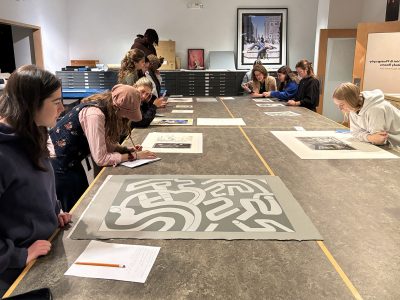Protecting Your Health in a Polarized World: Expert Advice on Political Stress
Feeling overwhelmed by politics? You’re not imagining it. The stress is real, and it can take a toll on your health.
According to national surveys conducted by the American Psychological Association, close to half of U.S. adults say politics are a significant stress point. Respondents listed problems such as lost sleep, shortened tempers and obsessive thoughts. What steps can people take to protect their health, maintain relationships with those they may disagree with and address their anxiety?

Afton Kapuscinski, associate professor of psychology and director of the Psychological Services Center in the College of Arts and Sciences, says being present in the moment, regulating your body and focusing on your gratitude list can help combat negative emotions. Kapuscinski’s research relates to the treatment and prevention of mental health issues in adults.
Professor Kapuscinski has talked extensively about navigating family conflict and mental health as it relates to political discourse. She sat down with SU News to provide practical strategies to protect mental and physical health and build bridges with those we disagree with.
Professor Kapuscincki is available for interviews.
What are the differences between healthy political concern and anxiety that could negatively impact your health?
All emotions, including uncomfortable ones like anxiety, have the potential to serve adaptive functions. Fear helps us to stay alert for threats, avoid danger and mobilize to action. Anxiety also serves as a critical reminder of what is most meaningful to us. However, distress also has the potential to impede us from taking constructive action and fully participating in our lives, which may be a sign it has crossed the line into a mental health concern. However, it is important to emphasize that high levels of distress and disruption can be normative under very stressful conditions such as grief and trauma, which is important to remember in a political climate where certain groups may experience greater vulnerability. Not all strong reactions are pathological, and self-reflection can often help us identify when our response to stress has become problematic.
What are the best ways to set healthy boundaries with your news and social media consumption to avoid feeling overwhelmed or helpless by political information?
The constant barrage of political headlines we encounter on a daily basis leaves people of all political leanings feeling hopeless and powerless. If we accept that our influence as an individual person is indeed limited, and level with ourselves that the costs of “doomscrolling” outweigh the benefits, then choosing to narrow the focus our energy may be an empowering option. Identifying a few issues to follow closely frees up time and energy to engage in political activism and advocacy in those areas, which in turn may buffer against feelings of helplessness. Alternatively, we might consider shrinking the time available for getting sucked into social media by purposefully filling our schedule with valued activities, such as sports, socialization and volunteer work.
How can people navigate difficult conversations about politics with friends and family?
If your aim in the conversation is solely to change another person’s viewpoint, then you may want to consider that most people’s beliefs only become more entrenched through argumentative exchanges. Therefore, some people find that avoiding political topics or agreeing not to discuss them leads to less conflict with their loved ones. That being said, I believe that having more conversations across the political divide also has the potential to strengthen individual relationships as well as our own capacity for complex thinking, empathy and self-reflection. Conversations work better when both parties are genuinely open to learning about what underlies the other’s beliefs and noticing points of overlap. Even if these conversations do not result in agreement, they may lead to other valuable outcomes like increased intimacy with a loved one. A compelling example of this type of dialogue was featured on a recent podcast episode of “This American Life” (Episode 854: Ten Things I Don’t Want to Hate About You).
What are some healthy ways to process and cope with feelings of grief, anger, or hopelessness related to political events?
- Avoid fixating on uncertainty and concerns that you cannot change. Make a commitment to being more present in your life through meaningful engagement with people and activities that leave less time for rumination.
- Regulate your body. Emotions are often referred to as feelings because they are deeply connected to our physical state; we experience them in our bodies. When our heart is pounding and our muscles are tense, we’re more likely to perceive threats around us. By calming our bodies, we can help ease our minds. This can be achieved through activities like exercise, guided meditation, physical touch or any method you know helps your body relax.
- Use gratitude to balance negativity during stressful times. Make an effort to reflect on positive experiences, thank others, and lean in to aspects of your life that make you feel grateful. A parallel idea involves seeking news outlets that specifically publish good news or frequenting sections of media websites devoted to inspiring and uplifting stories.
You provided excellent recommendations back in 2020 about managing your mental health around election season. Based on today’s political climate, is there anything you would change or add to those recommendations?
Addressing the polarization that contributes to the heated political climate and our own individual stress levels is complex, but we can each control how much we contribute to that dynamic in our relationships and communities. I am not suggesting we compromise our beliefs, but instead consider that, from a psychological perspective, polarized groups tend to characterize each other in stereotypes and view the opposing group as more threatening, which results in reduced willingness to have meaningful dialogue and lower expectation of finding any common ground. Research suggests that the more news and social media we consume (which has become highly polarized), the more likely we are to hold stereotyped views of others and to inaccurately estimate the percentage of people who hold both moderate and more extreme views on political issues. Thus, seeking out varied news sources and conversations across the political divide has the potential to reduce harmful bias and promote more productive dialogue.
To request interviews or get more information:
Daryl Lovell
Associate Director of Media Relations
Division of Communications
M 315.380.0206
dalovell@syr.edu | @DarylLovell



